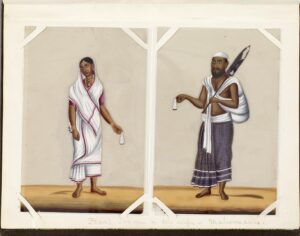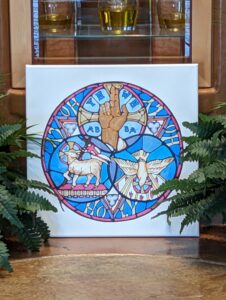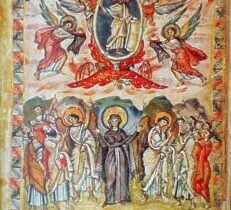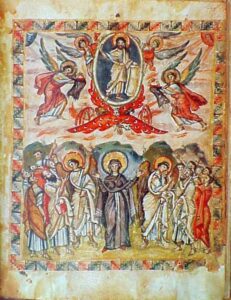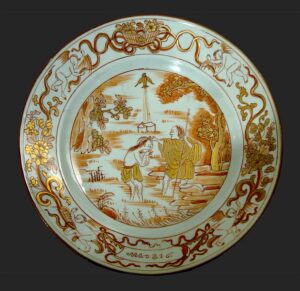Why Did You Doubt?
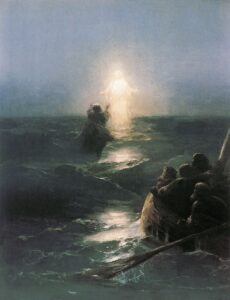 As humans, we like to have things in our lives happen in predictable ways. Babies learn to expect certain patterns of behavior from the people around them. I cry, someone picks me up and feeds me, or changes my diaper, or helps me burp. I can count on getting reassurance and help when I need it. If I don’t, something is terribly wrong and I will tell the world about it at the top of my lungs!
As humans, we like to have things in our lives happen in predictable ways. Babies learn to expect certain patterns of behavior from the people around them. I cry, someone picks me up and feeds me, or changes my diaper, or helps me burp. I can count on getting reassurance and help when I need it. If I don’t, something is terribly wrong and I will tell the world about it at the top of my lungs!
With older children and adults, life is easier if we know what to expect. What time do I need to get up? When do we eat? What do we eat? Where do I have to be at noon? And so on.
When natural disasters hit, or wars, or even unexpected heat or rain that upsets planned or ordinary activities, we want to know why that happened. Historically, people have blamed the natural disasters on divine activity. The gods are angry, with each other or with us. Think of the stories of Zeus or Thor, who used thunderbolts or a great hammer to fight when displeased.
Middle Eastern peoples also interpreted such happenings as being the result of the displeasure of their gods. This form of explanation was simply part of their everyday experience.
The prophet Elijah ran into trouble with the king when he defeated and killed the priests of Baal. Jezebel, wife of King Ahab, was not amused. In fact, she tried to wipe out all of the priests and prophets of the Lord. Elijah escaped into the wilderness, where an angel gave him food and drink, then sent him on his way to the mountain of the Lord, Mount Horeb/Mount Sinai. On the mountain top, there was a cave. Elijah was nervous about being on the Lord’s mountain. It was dangerous. If you saw the Lord, you would die.
But the Lord told him, “Go outside and stand on the mountain before the Lord…” Before Elijah could do as he was told there was an uproar outside. The wind roared around the mountain. Rocks were crushed. There was an earthquake, then a fire. To the ancients, all of these were signs of the presence of the divine.
But God wasn’t in these physical events. After all the uproar, there was a tiny, whispering sound. That was the presence of the Lord and Elijah hid his face in his cloak, then went out to meet the Lord. (1 Kgs 19:9a, 11-13a)
Jesus’ disciples also had a frightening experience. They had just seen Jesus feed a huge crowd of people with just a few loaves of bread and a few small fish – the lunch of a child who offered to help feed the rest. Jesus had sent the disciples to return home with the boat across the Sea of Galilee, a large inland lake. He sent the people home and went up on the mountain by himself for a little while to pray. (Taking time out to pray by himself was a common practice for him.)
From the mountain he noticed that a great storm had arisen on the lake and the boat was struggling to stay afloat. So he went down from the mountain. Just before dawn, the disciples noticed something coming across the water. They most likely believed there were monsters deep in the lake who caused storms. Ghosts were also easily believable in the middle of a storm. So, when they saw a figure coming across the top of the water, they were terrified.
Jesus called out to them, “Take courage, it is I; do not be afraid.” Well, could that be true? Might that be the kind of thing a ghost would say to lure them into a false sense of security? Peter responded, “Lord, if it is you, command me to come to you on the water.” Jesus said simply, “Come.” And Peter went over the side of the boat and walked towards Jesus.
All was well until Peter stopped to think about what he had just done. He had stepped over the side of the boat, in the middle of a storm, on a deep lake and was now walking towards what was either a ghost or his friend Jesus. Since people don’t walk on water, it might have just been a terrible mistake on his part. As such thoughts entered his mind, he began to sink into the water. He called out, “Lord, save me!” and Jesus reached out a hand and saved him, saying “O you of little faith, why did you doubt?” The waters calmed and they got safely to the boat again.
The use of the term Lord was significant. That was a term used for God. The disciples recognized who their friend was and bowed down to honor him. “Truly, you are the Son of God.”
Once again, the storms raged, the winds blew, disaster was upon ordinary people, and the Lord was there, quietly reassuring them. Elijah on the mountain, and the Lord was in the quiet whisper outside the cave. Peter sinking in the waters of the lake. “Why did you doubt?” I am here in the midst of it all. (Mt 14:22-33)
We can think we’ve got everything under control. We want to share our faith and our experiences with others. We have a good job, or at least a steady one. Our children are healthy. And then something unexpected happens. We lose a job. A friend gets cancer. A pandemic shuts down the world. Forest fires darken the skies with smoke. Hurricanes and tornadoes destroy communities. And we wonder what we did wrong. Why did God let these terrible things happen to us? Did God do all of this to punish us? Are these indicators that the end of time is upon us?
I think it’s important to remember Jesus’ question, “Why did you doubt?”
What is it that you doubt? What do I doubt? Which promise of the Lord do I need to trust more deeply.
In this week, let’s try to remember to trust that we are loved deeply and unconditionally by our Lord. Whatever happens, it’s not that God is angry and out to get me. It may be that there are unexpected consequences to choices we have made, but God doesn’t set out to punish us. We are free to make our choices and they don’t always work out as we had expected.
Sometimes, the hard or unexpected things that happen are the result of the actions of others. In those times, the Lord is with us too, sharing in our pain and offering loving support to help us get through the troubles. He has been through hard times too. He knows our pain and suffering. He wants to help and offer a hand to lift us out of the waters of doubt and despair.
With Peter, we reach out to his offered hand. We return to the boat, having recognized our Lord.
Readings for the Nineteenth Sunday of Ordinary Time – Cycle A
Read More




